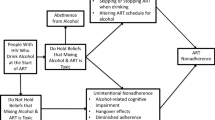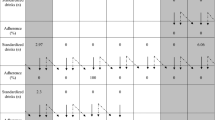Abstract
The life-saving effects of antiretroviral therapy (ART) in treating HIV infection are compromised by alcohol use. A growing body of research shows that both unintentional (e.g., memory lapses) and intentional (e.g., forgoing ART to avoid mixing with alcohol) contribute to ART non-adherence. Beliefs that it is harmful to mix alcohol with ART (alcohol-ART interactive toxicity beliefs) contribute to intentional non-adherence, but their role in overall adherence is not clear. This study conducted a clinic-based survey with 100 men and 193 women (mean age = 36) to examine the prevalence of alcohol-ART interactive toxicity beliefs and whether they contribute to treatment non-adherence in South Africa. One in three (36%, n = 106) participants reported no current alcohol use and 64% (n = 187) reported current alcohol use. The majority of participants, including current alcohol drinkers, endorsed beliefs that it is harmful to mix ART and alcohol, with 57% who currently drink reporting that they forgo taking ART when they are drinking. Participants reported being warned not to mix alcohol and ART from family, friends, and health care providers. In addition, 62% of participants who do not drink, as well as 36% of those who do drink, tell others not to mix alcohol and ART. Mediation modelling found that alcohol use directly predicts ART adherence, and that this relationship is partially mediated by alcohol-ART interactive toxicity beliefs. Health care providers can play a critical role in disputing interactive toxicity beliefs and encouraging patients to take ART even when they are drinking.

Similar content being viewed by others
References
Ammon, N., Mason, S., & Corkery, J. M. (2018). Factors impacting antiretroviral therapy adherence among human immunodeficiency virus-positive adolescents in Sub-Saharan Africa: A systematic review. Public Health, 157, 20–31. https://doi.org/10.1016/j.puhe.2017.12.010
Babor, T., Higgins-Biddle, J., Saunders, J., & Monteiro, M. (2001). The alcohol use disorders identification test: Guidelines for use inprimary care (2nd ed.). Geneva: World Health Organization.
Boerma, R., Schellekens, O., Rinke de Wit, T. F., Wit, F. W., van der Borght, S., Rijckborst, H., et al. (2019). Reaching 90-90-90: Outcomes of a 15-year multi-country HIV workplace programme in sub-Saharan Africa. Antiviral Therapy. https://doi.org/10.3851/IMP3311
Boretzki, J., Wolf, E., Wiese, C., Noe, S., Balogh, A., Meurer, A., et al. (2017). Highly specific reasons for nonadherence to antiretroviral therapy: Results from the German adherence study. Patient Prefer Adherence, 11, 1897–1906. https://doi.org/10.2147/PPA.S141762
Conroy, A. A., McKenna, S. A., Leddy, A., Johnson, M. O., Ngubane, T., Darbes, L. A., et al. (2017). “If she is drunk, i don’t want her to take it”: Partner beliefs and influence on use of alcohol and antiretroviral therapy in South African Couples. AIDS and Behavior, 21, 1885–1891. https://doi.org/10.1007/s10461-017-1697-6
Denison, J. A., Koole, O., Tsui, S., Menten, J., Torpey, K., van Praag, E., et al. (2015). Incomplete adherence among treatment-experienced adults on antiretroviral therapy in Tanzania, Uganda and Zambia. AIDS and Behavior, 29, 361–371. https://doi.org/10.1097/QAD.0000000000000543
Fatch, R., Emenyonu, N. I., Muyindike, W., Kekibiina, A., Woolf-King, S., & Hahn, J. A. (2017). Alcohol interactive toxicity beliefs and ART non-adherence among HIV-infected current drinkers in Mbarara, Uganda. AIDS and Behavior, 21, 1812–1824. https://doi.org/10.1007/s10461-016-1429-3
Gruber, V. A., Rainey, P. M., Lum, P. J., Beatty, G. W., Aweeka, F. T., & McCance-Katz, E. F. (2013). Interactions between alcohol and the HIV entry inhibitor Maraviroc. Journal of the International Association of Providers of AIDS Care, 12, 375–377. https://doi.org/10.1177/2325957413495567
Hahn, J. A., Emenyonu, N. I., Fatch, R., Muyindike, W. R., Kekiibina, A., Carrico, A. W., et al. (2016). Declining and rebounding unhealthy alcohol consumption during the first year of HIV care in rural Uganda, using phosphatidylethanol to augment self-report. Addiction, 111, 272–279. https://doi.org/10.1111/add.13173
Hahn, J. A., Fatch, R., Wanyenze, R. K., Baveewo, S., Kamya, M. R., Bangsberg, D. R., et al. (2014). Decreases in self-reported alcohol consumption following HIV counseling and testing at Mulago Hospital, Kampala, Uganda. BMC Infectious Diseases, 14, 403. https://doi.org/10.1186/1471-2334-14-403
Hayes, A. F. (2013). Model templates for PROCESS for SPSS and SAS. New York: Guilford Press.
Heestermans, T., Browne, J. L., Aitken, S. C., Vervoort, S. C., & Klipstein-Grobusch, K. (2016). Determinants of adherence to antiretroviral therapy among HIV-positive adults in sub-Saharan Africa: A systematic review. BMJ Global Health, 1, e000125. https://doi.org/10.1136/bmjgh-2016-000125
Hendershot, C. S., Stoner, S. A., Pantalone, D. W., & Simoni, J. M. (2009). Alcohol use and antiretroviral adherence: Review and meta-analysis. Journal of Acquired Immune Deficiency Syndromes, 52, 180–202. https://doi.org/10.1097/QAI.0b013e3181b18b6e
HIV.gov. (2018). The global HIV/AIDS epidemic. Retrieved October 15, 2019, from https://www.hiv.gov/hiv-basics/overview/data-and-trends/global-statistics
Judd, C. M., & Kenny, D. A. (1981). Process analysis: Estimating mediation in treatment evaluations. Evaluation Review, 5, 602–619.
Kader, R., Govender, R., Seedat, S., Koch, J. R., & Parry, C. (2015). Understanding the impact of hazardous and harmful use of alcohol and/or other drugs on ARV adherence and disease progression. PLoS ONE, 10, e0125088. https://doi.org/10.1371/journal.pone.0125088
Kalichman, S. C., Grebler, T., Amaral, C. M., McNerey, M., White, D., Kalichman, M. O., et al. (2013). Intentional non-adherence to medications among HIV positive alcohol drinkers: Prospective study of interactive toxicity beliefs. Journal of General Internal Medicine, 28, 399–405. https://doi.org/10.1007/s11606-012-2231-1
Kalichman, S. C., Kalichman, M. O., Cherry, C., Hoyt, G., Washington, C., Grebler, T., et al. (2015). Intentional medication nonadherence because of interactive toxicity beliefs among HIV-positive active drug users. Journal of Acquired Immune Deficiency Syndromes, 70, 503–509. https://doi.org/10.1097/QAI.0000000000000776
Kalichman, S., Mathews, C., Banas, E., & Kalichman, M. (2019). Alcohol-related intentional nonadherence to antiretroviral therapy among people living with HIV, Cape Town, South Africa. AIDS Care, 31, 951–957. https://doi.org/10.1080/09540121.2019.1587357
Magidson, J. F., Saal, W., Nel, A., Remmert, J. E., & Kagee, A. (2017). Relationship between depressive symptoms, alcohol use, and antiretroviral therapy adherence among HIV-infected, clinic-attending patients in South Africa. Journal of Health Psychology, 22, 1426–1433. https://doi.org/10.1177/1359105316628743
Maisto, S. A., Conigliaro, J., McNeil, M., Kraemer, K., & Kelley, M. E. (2000). An empirical investigation of the factor structure of the AUDIT. Psychological Assessment, 12, 346–353.
McCance-Katz, E. F., Gruber, V. A., Beatty, G., Lum, P. J., & Rainey, P. M. (2013). Interactions between alcohol and the antiretroviral medications ritonavir or efavirenz. Journal of Addiction Medicine, 7, 264–270. https://doi.org/10.1097/ADM.0b013e318293655a
Meyer-Rath, G., Johnson, L. F., Pillay, Y., Blecher, M., Brennan, A. T., Long, L., et al. (2017). Changing the South African national antiretroviral therapy guidelines: The role of cost modelling. PLoS ONE, 12, e0186557. https://doi.org/10.1371/journal.pone.0186557
Morojele, N. K., Kekwaletswe, C. T., & Nkosi, S. (2014). Associations between alcohol use, other psychosocial factors, structural factors and antiretroviral therapy (ART) adherence among South African ART recipients. AIDS and Behavior, 18, 519–524. https://doi.org/10.1007/s10461-013-0583-0
Motsoaledi, A. (2016). Adherence guidelines for HIV, TB, and NCDs. Retrieved from South Africa.
Mukumbang, F. C., Van Belle, S., Marchal, B., & Van Wyk, B. (2016). Realist evaluation of the antiretroviral treatment adherence club programme in selected primary healthcare facilities in the metropolitan area of Western Cape Province, South Africa: A study protocol. British Medical Journal Open, 6, e009977. https://doi.org/10.1136/bmjopen-2015-009977
Nkosi, S., Rich, E. P., Kekwaletswe, C. T., & Morojele, N. K. (2016). Experiences of alcohol consumption and taking antiretroviral medication among men living with HIV in Tshwane, South Africa. African Journal of AIDS Research, 15, 367–376. https://doi.org/10.2989/16085906.2016.1255651
Nouaman, M. N., Vinikoor, M., Seydi, M., Ekouevi, D. K., Coffie, P. A., Mulenga, L., et al. (2018). High prevalence of binge drinking among people living with HIV in four African countries. Journal of the International AIDS Society, 21, e25202. https://doi.org/10.1002/jia2.25202
Parry, C. D., Kekwaletswe, C., Shuper, P. A., Nkosi, S., Myers, B. J., & Morojele, N. K. (2016). Heavy alcohol use in patients on highly active antiretroviral therapy: What responses are needed? South African Medical Journal, 106, 43–44. https://doi.org/10.7196/SAMJ.2016.v106i6.10639
Pearson, C. R., Simoni, J. M., Hoff, P., Kurth, A. E., & Martin, D. P. (2007). Assessing antiretroviral adherence via electronic drug monitoring and self-report: An examination of key methodological issues. AIDS and Behavior, 11, 161–173. https://doi.org/10.1007/s10461-006-9133-3
Pellowski, J. A., Kalichman, S. C., Kalichman, M. O., & Cherry, C. (2016). Alcohol-antiretroviral therapy interactive toxicity beliefs and daily medication adherence and alcohol use among people living with HIV. AIDS Care, 28, 963–970. https://doi.org/10.1080/09540121.2016.1154134
Santos, G. M., Emenyonu, N. I., Bajunirwe, F., Rain Mocello, A., Martin, J. N., Vittinghoff, E., et al. (2014). Self-reported alcohol abstinence associated with ART initiation among HIV-infected persons in rural Uganda. Drug and Alcohol Dependence, 134, 151–157. https://doi.org/10.1016/j.drugalcdep.2013.09.025
Saunders, J. B., Aasland, O. G., Babor, T. F., DeLaFuente, J. R., & Grant, M. (1993). Development of the alcohol use disorders identification test (AUDIT): WHO collaborative project on early detection of persons with harmful alcohol consumption II. Addictions, 88, 791–804.
Shubber, Z., Mills, E. J., Nachega, J. B., Vreeman, R., Freitas, M., Bock, P., et al. (2016). Patient-reported barriers to adherence to antiretroviral therapy: A systematic review and meta-analysis. PLOS Medicine, 13, e1002183. https://doi.org/10.1371/journal.pmed.1002183
Sileo, K. M., Simbayi, L. C., Abrams, A., Cloete, A., & Kiene, S. M. (2016). The role of alcohol use in antiretroviral adherence among individuals living with HIV in South Africa: Event-level findings from a daily diary study. Drug and Alcohol Dependence, 167, 103–111. https://doi.org/10.1016/j.drugalcdep.2016.07.028
Simoni, J. M., Amico, K. R., Pearson, C. R., & Malow, R. (2008). Strategies for promoting adherence to antiretroviral therapy: A review of the literature. Current Infectious Disease Reports, 10, 515–521.
Simoni, J. M., Pearson, C. R., Pantalone, D. W., Marks, G., & Crepaz, N. (2006). Efficacy of interventions in improving highly active antiretroviral therapy adherence and HIV-1 RNA viral load: A meta-analytic review of randomized controlled trials. Journal of Acquired Immune Deficiency Syndromes, 43, S23–S35. https://doi.org/10.1097/01.qai.0000248342.05438.52
UNAIDS. (2014). 90-90-90: An ambitious treatment target to help end the AIDS epidemic. UNAIDS Retrieved October 15, 2019, from http://www.unaids.org/sites/default/files/media_asset/90-90-90_en.pdf
UNAIDS. (2017). Global AIDS monitoring 2017: UNAIDS Data. Retrieved October 15, 2019, from http://www.unaids.org/sites/default/files/media_asset/20170720_Data_book_2017_en.pdf
UNAIDS. (2019). Data 2018. Retrieved October 15, 2019, from https://www.unaids.org/sites/default/files/media_asset/unaids-data-2018_en.pdf
Wandera, B., Tumwesigye, N. M., Nankabirwa, J. I., Kambugu, A. D., Parkes-Ratanshi, R., Mafigiri, D. K., et al. (2015). Alcohol consumption among HIV-infected persons in a large urban HIV clinic in Kampala Uganda: A constellation of harmful behaviors. PLoS ONE, 10, e0126236. https://doi.org/10.1371/journal.pone.0126236
Wilson, I. B., Fowler, F. J., Jr., Cosenza, C. A., Michaud, J., Bentkover, J., Rana, A., et al. (2014). Cognitive and field testing of a new set of medication adherence self-report items for HIV care. AIDS and Behavior, 18, 2349–2358. https://doi.org/10.1007/s10461-013-0610-1
Funding
This study was supported by the National Institute of Mental Health (Grant No. R01-MH119913) and National Institute on Alcohol Abuse and Alcoholism (Grand No. R01-AA023727).
Author information
Authors and Affiliations
Corresponding author
Ethics declarations
Conflict of interest
Seth Kalichman, Catherine Mathews, Ellen Banas and Moira Kalichman declare that they have no conflict of interest.
Human participants
All procedures performed in studies involving human participants were in accordance with the ethical standards of the institutional research ethics committee (IRB) and with the 1964 Helsinki declaration and its later amendments or comparable ethical standards.
Informed consent
Informed consent was obtained from all participants included in this study.
Additional information
Publisher's Note
Springer Nature remains neutral with regard to jurisdictional claims in published maps and institutional affiliations.
Rights and permissions
About this article
Cite this article
Kalichman, S.C., Mathews, C., Banas, E. et al. Alcohol-related beliefs and non-adherence to antiretroviral therapy in Cape Town, South Africa. J Behav Med 43, 764–772 (2020). https://doi.org/10.1007/s10865-020-00135-4
Received:
Accepted:
Published:
Issue Date:
DOI: https://doi.org/10.1007/s10865-020-00135-4




